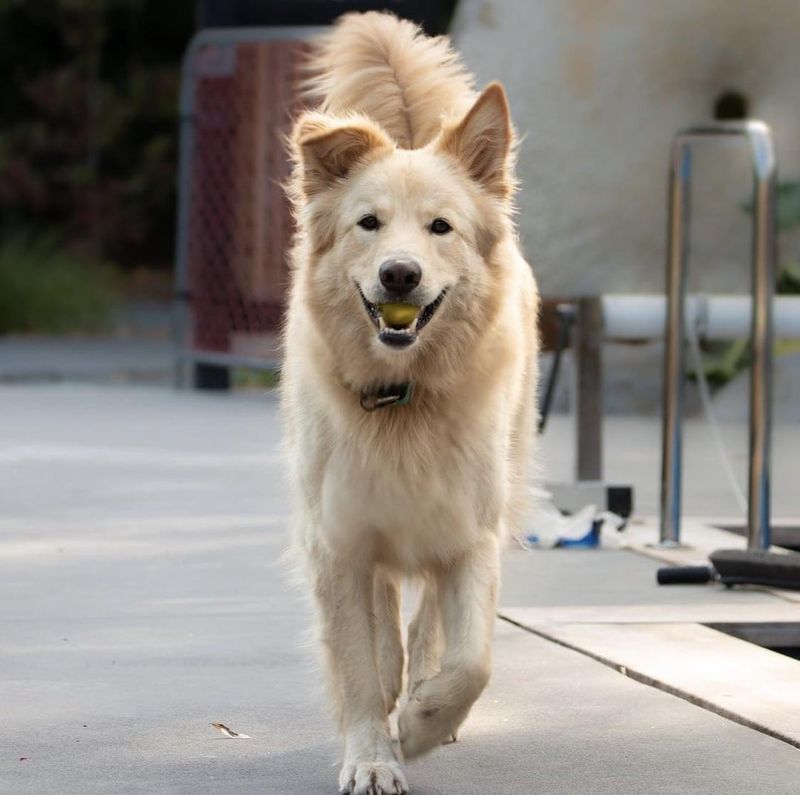📖 Table of Content:
Looking for a dog that combines intelligence, loyalty, and a heart of gold? Enter the Golden Shepherd, a stunning mix of the ever-charming Golden Retriever and the fiercely loyal German Shepherd.
This hybrid breed is stealing hearts with its blend of good looks, sharp smarts, and an endless capacity for love. But before you bring one of these gorgeous pups home, there’s plenty to learn about what makes them so special.
From their high energy levels to their need for mental stimulation, the Golden Shepherd is not your average canine companion. Whether you’re curious about their temperament, grooming needs, or how they’ll fit into your family life, we’ve got you covered.
Here are 10 must-know facts about this incredible breed mix that will help you decide if they’re your next four-legged soulmate!
1. Appearance
The Golden Shepherd boasts an impressive appearance, blending the best of both parent breeds. Their medium to large size is a reflection of their German Shepherd lineage, while the golden hues nod to the Retriever.
Their coat is typically dense and water-resistant, perfect for outdoor adventures. Regular grooming is essential to maintain its shine and health, requiring weekly brushing to prevent matting.
Their athletic build and expressive eyes make them captivating companions. This breed’s unique markings often include a mix of browns, golds, and blacks, with ears that may stand erect or have a slight flop. Whether lounging at home or romping in the park, their striking appearance never goes unnoticed.
2. Temperament
They typically inherit a wonderful temperament, combining the gentle nature of the Golden Retriever with the alertness of the German Shepherd. They are incredibly loyal and form strong bonds with their families, making them ideal family pets.
These dogs are known for their intelligence and eagerness to please, which makes training a rewarding experience. Their playful and friendly nature makes them great playmates for children, while their protective instincts ensure they are excellent watchdogs.
Socialization is key to nurturing their best traits, helping them become well-rounded and confident dogs. With the right environment and training, Golden Shepherds blend seamlessly into family life, offering affection and companionship.
3. Exercise Needs
Their energy levels demand daily physical activity, which helps keep them mentally and physically fit.
Engaging them in various activities like running, hiking, or playing fetch provides excellent outlets for their exuberance. These activities not only keep them healthy but also strengthen the bond with their owners.
It’s important to tailor exercise routines to their age and health condition, ensuring they are not overexerted. A balanced mix of physical and mental stimulation keeps them happy and prevents boredom-related behaviors like chewing or digging. Consistent exercise is key to a well-behaved Golden Shepherd.
4. Training
Training a Golden Shepherd can be a delightful experience due to their intelligence and eagerness to please. Early training is crucial to harness their potential and establish good behavior.
Positive reinforcement techniques work best, as these dogs respond well to encouragement and rewards. Consistency is vital, as is incorporating a variety of commands and tasks to keep them engaged.
Socialization should also be part of their training regimen, exposing them to different environments and situations. This helps them become adaptable and well-rounded. With patience and dedication, a Golden Shepherd can excel in obedience and even agility courses, showcasing their versatility.
5. Diet
A balanced diet is essential for maintaining the health and vitality of a Golden Shepherd. High-quality dog food, tailored to their age, weight, and activity level, provides the necessary nutrients.
Protein is particularly important for supporting their muscular build and energy levels. Including vegetables and grains can offer additional vitamins and minerals, contributing to their overall well-being.
Regular vet check-ups help in adjusting their diet to any specific health needs or conditions. Portion control is also crucial to prevent obesity, ensuring they maintain a healthy weight. Proper nutrition plays a key role in their longevity and quality of life.
6. Health Concerns
Golden Shepherds, like all breeds, have specific health concerns to watch for. Common issues include hip dysplasia, a condition inherited from both parent breeds, and allergies, which can affect their skin and coat.
Regular veterinary check-ups are essential for early detection and management of these conditions. Preventive measures, like a balanced diet and regular exercise, contribute significantly to their well-being.
It’s also important to monitor their ears and teeth, areas prone to infections if neglected. Vaccinations and parasite control should be part of their health regimen. By staying proactive with their healthcare, you ensure a happy, healthy Golden Shepherd.
7. Grooming
Grooming a Golden Shepherd is an essential part of their care routine. Their dense, water-resistant coat needs regular attention to stay healthy and looking its best.
Weekly brushing helps reduce shedding and prevent mats, especially during seasonal changes when they shed more. Bathing should be done as needed, ensuring not to strip their coat of natural oils.
Attention to their ears, nails, and teeth is also important. Regular ear checks prevent infections, while keeping nails trimmed avoids discomfort. Brushing their teeth regularly promotes good oral health. A consistent grooming routine keeps them comfortable and enhances their appearance.
8. Living Environment
Golden Shepherds thrive in environments where they can be part of the family dynamic. They need space to move and play, making them better suited for homes with a yard.
However, they can adapt to apartment living if given sufficient exercise and mental stimulation. Their social nature means they do not do well in isolation, so they benefit from being included in family activities.
Their protective instincts make them excellent watchdogs, though they should be trained not to become overly territorial. A loving home where they are cherished and engaged is ideal, ensuring they remain happy and well-adjusted companions.
9. Socialization
Socialization is crucial for a well-adjusted Golden Shepherd. Early exposure to various environments, people, and animals helps them develop confidence and prevents behavioral issues.
Puppy classes and regular visits to dog parks are excellent ways to enhance their social skills. These experiences teach them how to interact appropriately with different dogs and people.
Socialization is an ongoing process, necessary throughout their life. It helps them adapt to new situations and reduces the risk of fear-based reactions. A well-socialized Golden Shepherd is a pleasure to have around, showcasing their friendly and adaptable nature.
10. Adoption Considerations
Adopting a Golden Shepherd is a rewarding decision, but it comes with responsibilities. Prospective owners should consider the time and energy needed to care for this active breed.
Researching their needs and ensuring you can meet them is crucial. Visiting shelters or breed-specific rescues can provide options for adoption, and allows you to meet dogs that fit your lifestyle.
It’s important to understand their exercise, grooming, and health needs before bringing one home. Commitment to their well-being leads to a fulfilling relationship. Adoption not only changes the life of the dog but brings joy and companionship to your family.










